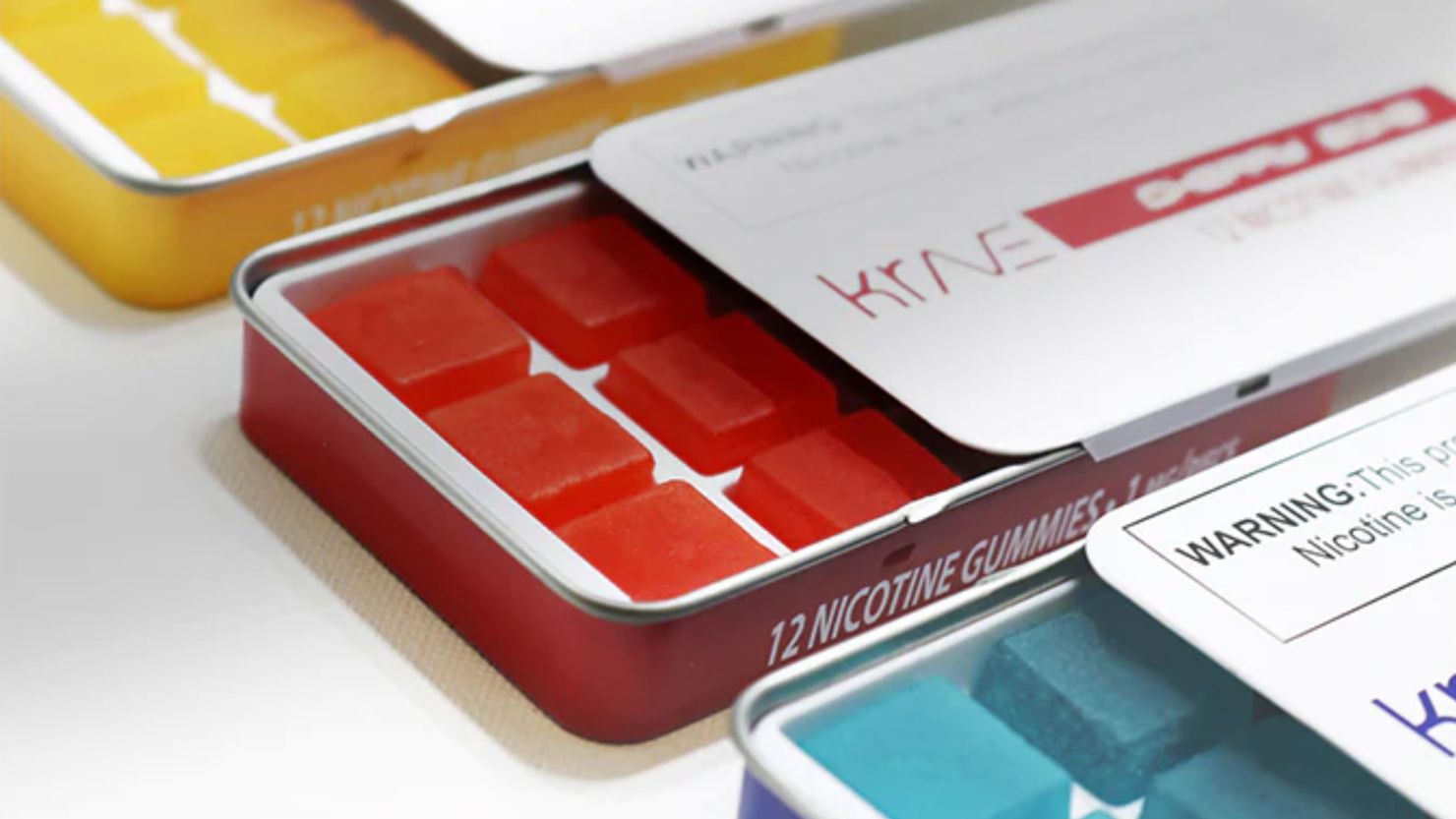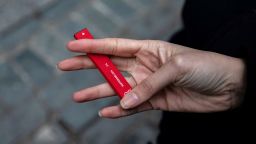First, there were flavored cigarettes that tasted like chocolate or grape. Then came the e-cigarettes in flavors like cotton candy or gummy bear. Now, there are flavored gummies made with nicotine, and the US Food and Drug Administration isn’t happy about it.
The agency has been warning parents to keep an eye out for products that may look like typical candy but are actually nicotine-based. It says they could be very dangerous for children.
“Nicotine gummies are a public health crisis just waiting to happen among our nation’s youth, particularly as we head into a new school year,” FDA Commissioner Dr. Robert Califf warned last month.
The FDA last month sent a warning letter to VPR Brands, one of the companies that makes nicotine gummies, advising that the products were being sold illegally. By law, manufacturers need to submit an application and have it approved by the FDA before a tobacco product can be legally marketed in the United States. The agency says VPR had not asked for this “premarket authorization” for the gummies.
Each of the gummies had 1 milligram of nicotine, and they came 12 to a package. The FDA says 1 to 4 milligrams of nicotine could be severely toxic to children under 6 as well as to older children, depending on their weight.
The website for VPR’s Krave brand says the tobacco-free products were meant to “empower adult smokers with the tools to use nicotine on their own terms.” But the gummies’ bright colors and fruit flavors like “blueraz,” “cherry bomb” and pineapple could also appeal to kids.
VPR Brands did not respond to CNN’s request for comment, and the website now says the gummies have been discontinued.
But oher companies’ nicotine products that look like candy are still available, as well as lozenges, pouches and gum.
There’s no clear data that documents how pervasive the gummies or any other candy-like nicotine product have become. But if a recent study of nicotine use in Southern California is any indication, they are popular.
In that survey, ninth- and 10th-graders who reported using nicotine were more likely to use flavored non-tobacco oral nicotine products – gummies, tablets, lozenges and gums – than many more traditional products like cigarettes. They were second only to the ever-popular e-cigarettes. About 10% of kids surveyed used e-cigarettes, and more than 3% chose the oral nicotine products.
‘Truly, truly troubling’
Nicotine gum and lozenges have been on the market for years. Gummy products were a relative newcomer, said Erika Sward, assistant vice president for national advocacy for the American Lung Association. That has her concerned.
The gummies were on the market for about six to nine months before the FDA sent its warning letter, she said, and that’s a sign that there will probably be many more kid-friendly nicotine products to come.
“The FDA oversight of these products is not going as fast as it needs to be,” Sward said. She was encouraged by the warning letter but says it’s not enough. “I think until the FDA shows that they’re serious about cracking down on these companies that are coming out with these products, it’s going to continue to be a problem.”
She added that it is especially worrisome that companies know they can’t introduce a product without the FDA’s premarket signoff, but do it anyway.
“This is truly, truly troubling from the perspective of parents or anyone in general thinking that if a product is on the market, that somebody’s taking a look at it, and we know that’s just not the case,” Sward said.
The FDA has been allowed to regulate synthetic nicotine only since earlier this year, after Congress gave the agency authority over non-tobacco nicotine products.
The agency said in a statement to CNN that it’s “deeply committed to addressing the ongoing public health concerns around all youth tobacco use” and “will continue to take appropriate enforcement actions that are supported by evidence.”
“Manufacturers of any illegal products, including nicotine gummies, should be on alert that FDA is actively working to identify violations and will swiftly seek corrective actions. Importantly, no nicotine gummy products have been authorized by the FDA, and therefore, any products currently being sold are doing so illegally,” the agency said this week.
FDA enforcement
For years, the FDA has been cracking down on companies that have tried to sell certain kinds of nicotine products that echo kid-friendly foods. In 2020, it restricted flavors in vaping devices, which came in options like Charms cereal, cherry lime cola and Heavy Custard Unicorn Cake.
In 2019, the FDA chastised e-cigarette giant Juul for the way it marketed its products, including a school presentation in which the company said that the product was “totally safe” and that the “FDA would approve it any day.” In June, it ordered the company to stop selling its products. But a court blocked the ban, so the products are still for sale.
After a two-year investigation found that Juul deliberately marketed its product to children, several state attorneys general announced this week that the company will pay a settlement of $438.5 million to 34 states and territories.
The US Centers for Disease Control and Prevention still considers kids’ e-cigarette use a serious public health concern.
During the pandemic, vaping rates among teens declined for the first time in years. But CDC Foundation data showed that e-cigarette sales went up just as kids started going back to school, according to Matt Meyers, president of the Campaign for Tobacco Free Kids.
In 2021, about 2.55 million students reported using some form of tobacco product, according to CDC surveys.
Disposable flavored vapes, which use synthetic nicotine, are especially popular with kids. These products come in flavors like sugar cookie, mango, pound cake and fizzy lemonade.
The companies that make products with synthetic nicotine have argued that they didn’t need to follow the rules that apply to other nicotine products because theirs didn’t contain tobacco. A 2009 law finally allowed the FDA to regulate nicotine products, but it specified nicotine that came from tobacco.
In April, a new law clarified that the FDA could regulate products that use synthetic nicotine. But many of the products are still for sale as the agency reviews the manufacturers’ applications to remain on the market. The FDA blew its court-ordered deadline to make a decision about the products.
Manufacturers had until May to submit marketing applications to FDA, and if the products didn’t get authorization by July, the products were supposed to be considered illegal and removed from the market.
“The law gives the FDA the tools to move quickly,” Myers said, but it doesn’t often use them.
Anti-tobacco experts say that although it’s good that the FDA has taken some action on nicotine gummy products, the agency should be doing a lot more.
Get CNN Health's weekly newsletter
Sign up here to get The Results Are In with Dr. Sanjay Gupta every Tuesday from the CNN Health team.
“What nicotine gummies proves – or just remind us of – is the absence of the FDA drawing a hard line in the sand. Our kids are more at risk of being exposed to addictive nicotine products than they have in a very long time,” Myers said. “The FDA’s enforcement has been so sporadic, and when companies believe that there is profits to be made, we will continue to see the introduction of new nicotine-laced products that appeal to kids.”






